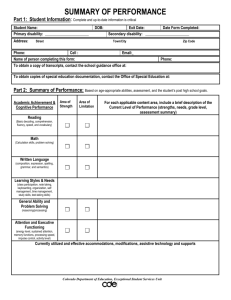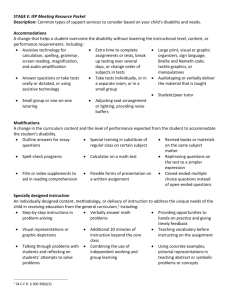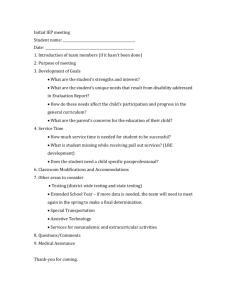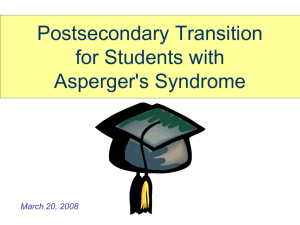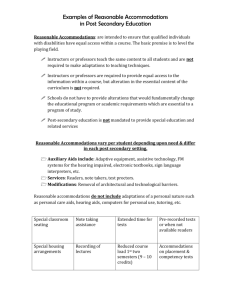summary of performance template - Project 10: Transition Education
advertisement
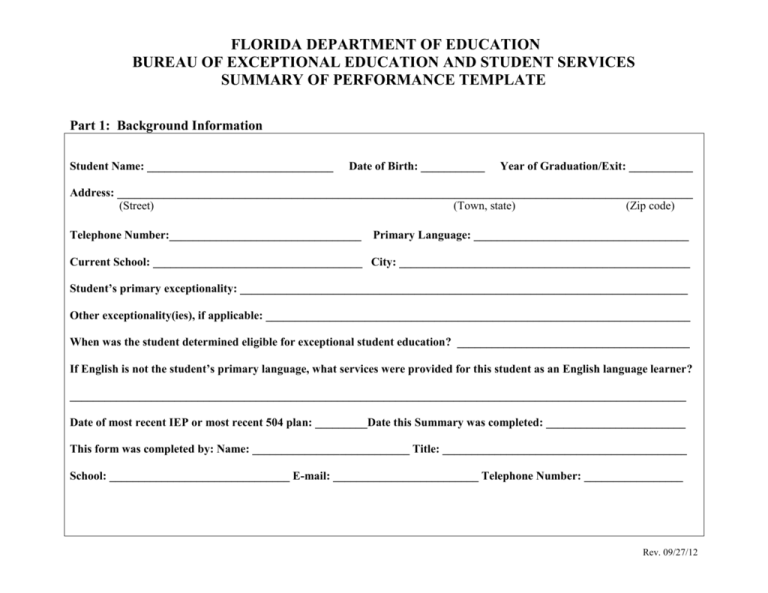
FLORIDA DEPARTMENT OF EDUCATION BUREAU OF EXCEPTIONAL EDUCATION AND STUDENT SERVICES SUMMARY OF PERFORMANCE TEMPLATE Part 1: Background Information Student Name: ________________________________ Date of Birth: ___________ Year of Graduation/Exit: ___________ Address: ___________________________________________________________________________________________________ (Street) (Town, state) (Zip code) Telephone Number:_________________________________ Primary Language: _____________________________________ Current School: ____________________________________ City: __________________________________________________ Student’s primary exceptionality: _____________________________________________________________________________ Other exceptionality(ies), if applicable: _________________________________________________________________________ When was the student determined eligible for exceptional student education? ________________________________________ If English is not the student’s primary language, what services were provided for this student as an English language learner? __________________________________________________________________________________________________________ Date of most recent IEP or most recent 504 plan: _________Date this Summary was completed: ________________________ This form was completed by: Name: ___________________________ Title: __________________________________________ School: _______________________________ E-mail: _________________________ Telephone Number: _________________ Rev. 09/27/12 2 Please check and include the most recent copy of assessment reports you are attaching which clearly identify the student’s disability or functional limitations and/or will assist in postsecondary planning: □ □ □ □ □ □ □ □ □ □ □ Psychological/cognitive □ Response to Intervention (RTI) Neuropsychological □ Language proficiency assessments Medical/physical □ Reading assessments Achievement/academics □ Communication Adaptive behavior □ Behavioral analysis Social/interpersonal skills □ Classroom observations (or in other settings) Community-based assessment □ Career/vocational or transition assessment Self-determination □ Assistive technology Informal assessment: _________________________________________________________________________ Informal assessment: _________________________________________________________________________ Other: _____________________________________________________________________________________ Part 2 – Student’s Postsecondary Goal(s) 1. 2. 3. Rev. 09/27/12 3 Part 3 – Student Input (Highly Recommended) SUMMARY OF PERFORMANCE: STUDENT PERSPECTIVE A. How does your disability affect your schoolwork and school activities (such as grades, relationships, assignments, projects, communication, time on tests, mobility, extra-curricular activities)? B. In the past, what supports have been tried by teachers or by you to help you succeed in school (aids, adaptive equipment, physical accommodations, other services)? C. Which of these accommodations and supports has worked best for you? Why do you think they worked best? D. Which of these accommodations and supports have not worked? Why do you think they did not work? E. What strengths and needs should professionals know about you as you enter the postsecondary education or work environment? F. What areas do you think you need to improve upon (communication, self-advocacy, study skills, etc.)? Rev. 09/27/12 4 Part 4 – Summary of Performance ACADEMIC CONTENT AREA (Complete all that are relevant to the student.) Present Level of Performance (grade level, standard scores, strengths, needs) Essential accommodations or modifications, and/or assistive technology utilized in high school, and why needed. Reading (Basic reading/decoding; reading comprehension; reading speed) Math (Calculation skills, algebraic problem solving; quantitative reasoning) Written Language (written expression, spelling) Learning Skills (class participation, note taking, keyboarding, organization, homework management, time management, study skills, test-taking skills) Rev. 09/27/12 5 FUNCTIONAL AREAS Present Level of Performance (strengths and needs) Essential accommodations or modifications and/or assistive technology utilized in high school and why needed. Social Skills and Behavior (Interactions with teachers/peers, level of initiation in asking for assistance, responsiveness to services and accommodations, degree of involvement in extracurricular activities, confidence and persistence as a learner, emotional or behavioral issues related to learning and/or attention) Independent Living Skills (Self-care, leisure skills, personal safety, transportation, banking, budgeting) Environmental Access/Mobility (assistive technology, mobility, transportation) Rev. 09/27/12 6 FUNCTIONAL AREAS (continued) Present Level of Performance (strengths and needs) Essential accommodations or modifications and/or assistive technology utilized in high school and why needed Self-Determination Self-Advocacy Skills (Ability to identify and articulate postsecondary goals, learning strengths and needs; independence and ability to ask for assistance with learning) CareerVocational/Transition/ Employment (Career interests, career exploration, job training, employment experiences and supports) Additional considerations that can assist in making decisions about disability determination and needed accommodations (e.g., medical problems, family concerns, sleep disturbance) Rev. 09/27/12 7 Part 5 – Recommendations to assist the student in meeting postsecondary goals Suggestions for accommodations, adaptive devices, assistive services, compensatory strategies, and/or collateral support services to enhance access in the following post-high school environments (only complete those relevant to the student’s postsecondary goals). Education and Training Employment Independent living I have reviewed and agree with the content of this Summary of Performance. Student Signature: _________________________________________ Date: _________________________ This template was adapted from the template developed by the National Transition Documentation Summit © 2005 including representation from the Association on Higher Education and Disability (AHEAD), the Council for Exceptional Children’s Division on Career Development and Transition (DCDT), and Division on Learning Disabilities (DLD), the National Joint Committee on Learning Disabilities (NJCLD), the Learning Disability Association (LDA) and the National Center on Learning Disabilities (NCLD). It was based on the initial work of Stan Shaw, Carol Kochhar-Bryant, Margo Izzo, Ken Benedict, and David Parker. It reflects the contributions and suggestions of numerous stakeholders in professional organizations, school districts and universities particularly the Connecticut Interagency Transition Task Force. It is available to be freely copied or adapted for educational purposes. Rev. 09/27/12


